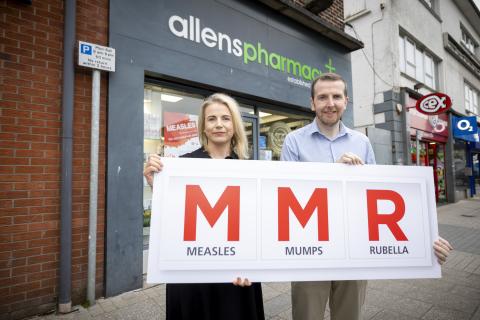Community pharmacies encourage people to get the MMR vaccine

A new campaign focussing on the importance of getting the MMR (measles, mumps and rubella) vaccine has been launched in community pharmacies across Northern Ireland, as the total laboratory confirmed cases of measles in Northern Ireland stands at 11.
The MMR campaign highlights the importance of vaccination in protecting against measles, mumps and rubella which are highly infectious viruses that can easily spread between unvaccinated people. The campaign is running in community pharmacies throughout June and July as part of the Living Well service.
Living Well is offered in over 500 pharmacies across Northern Ireland and provides information and advice on public health issues. It is delivered in partnership with the Public Health Agency (PHA), Community Pharmacy NI (CPNI), and the Department of Health (DoH).
Geraldine Mallon, Immunisation Programme Manager, PHA said: “Measles is on the rise. It is highly infectious and can easily spread between unvaccinated people. We have seen a fall in the numbers of children receiving the MMR vaccines and these children are at risk. It is therefore important that unvaccinated children and young adults get any missed MMR vaccines as soon as possible.
“If you are unsure if you or your child is up-to-date with vaccinations, the easiest way to check is to look at your child’s red book or speak to your GP practice. If you or your child has missed any vaccination, please book an appointment as soon as you can to make sure of maximum protection.”
Two doses of the MMR vaccine help provide the best protection against measles, mumps and rubella.
Measles can be unpleasant and will usually clear in about seven to 10 days without causing any further problems. Unfortunately, for some individuals, measles can lead to serious and potentially life-threatening complications. It used to be very common in children, but following the introduction of the MMR vaccine, cases became rare, with no confirmed cases in Northern Ireland in the last seven years, until recently.
Dean Lennon, community pharmacist at Allens Pharmacy, Cookstown added: “As trusted healthcare professionals found at the heart of local communities, community pharmacists are well placed to provide advice and reassurance to parents and the public on the MMR vaccine. Equipped with this information, parents will have a better understanding of the crucial role the MMR vaccine plays in protecting their children against the highly infectious viruses.”
As measles is very infectious it is important that anyone with suspected measles avoids any situation where they can spread the disease, such as a GP’s waiting room or an emergency department. People should phone in advance and get advice rather than turning up to a healthcare setting, except in an emergency.
The initial symptoms of measles can include:
- a high temperature (fever);
- a runny or blocked nose;
- sneezing;
- a cough;
- sore, red eyes that may be sensitive to light;
- a few days later, a red-brown blotchy rash will appear. This may start on the head or upper neck, before spreading outwards to the rest of the body.
Most childhood rashes are not measles but you should consult your GP without delay if:
- you suspect it is measles;
- symptoms worsen;
- temperature increases to above 38°C;
- temperature stays high after other symptoms have gone.
For information on the MMR vaccination see www.nidirect.gov.uk/mmr
For further information on measles see www.nidirect.gov.uk/conditions/measles
- Confirmed measles cases are notified to the Public Health Agency and recorded at www.pha.site/MeaslesData. The report is updated every Thursday.
- Prior to 2024 the last confirmed case of measles in Northern Ireland was in 2017
